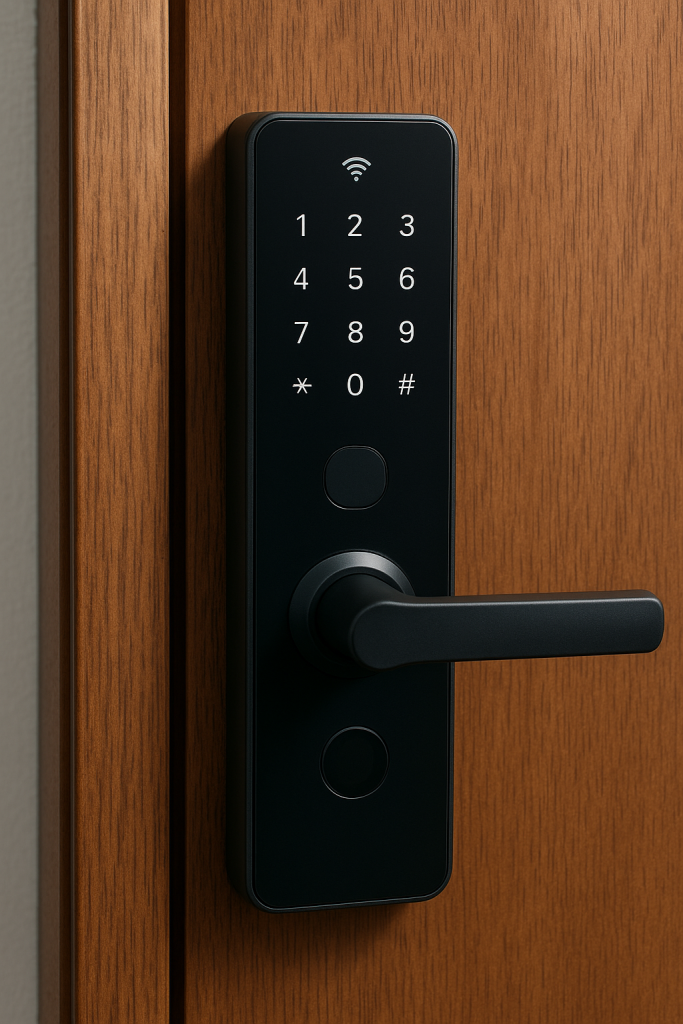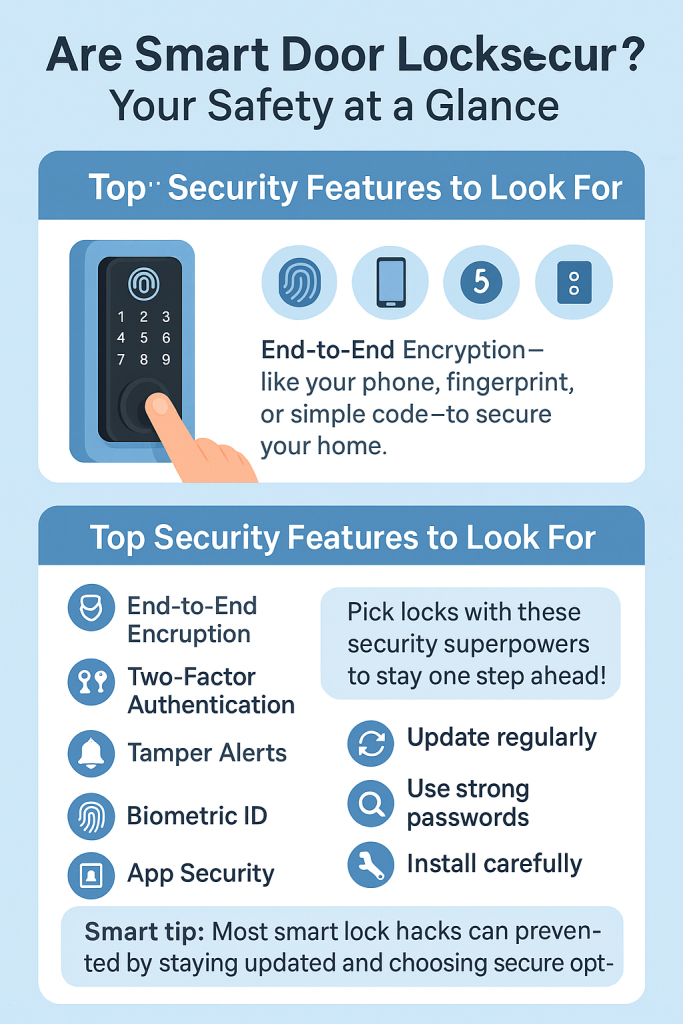Imagine coming home after school, walking up to your front door, and instead of pulling out keys, you simply tap your finger or enter a quick code. Sounds pretty cool, right? Smart door locks have made this futuristic scenario a reality for many families. But, with every new technology, there’s always a big question—are smart door locks really safe?
Let’s dive in and see if these high-tech locks are truly secure or if they’re just fancy gadgets.
Smart Door Lock Security Overview
Smart door locks can make life easier, but like any tech, they aren’t perfect. You might be wondering, “Are smart locks safe?” Well, generally, yes. But, just like regular locks, they come with their own risks. Imagine your door lock like a shield—it protects your home, but if it has weaknesses, someone might get through.
Smart lock vulnerabilities can include software problems, weak passwords, or hackers finding sneaky ways to break in. The good news? Knowing these risks can help you stay one step ahead.
Types of Smart Locks and Their Safety
Different smart locks use different ways to keep your home safe:
- Bluetooth Smart Locks: These locks use Bluetooth to unlock your door when your phone is near. They’re secure, but only if you keep your phone safe.
- Wi-Fi Smart Locks: These locks let you open doors remotely, but need strong Wi-Fi security to avoid hackers.
- Keypad Smart Locks: These locks use a PIN, much like an ATM. They’re safe as long as your PIN isn’t easy to guess.
- Fingerprint Smart Locks: Only your fingerprint unlocks these, making them very secure, unless someone tricks the sensor.
- Z-wave Smart Locks: These locks connect to home automation systems and can be very secure if the network is properly protected.

Common Threats to Smart Locks
Let’s talk about some threats to smart locks:
- Hacking: Yes, smart locks can sometimes get hacked. Clever hackers might figure out how to trick your lock into opening.
- Firmware Attacks: If your smart lock isn’t updated, it might become vulnerable.
- Bypassing: Sometimes, thieves don’t hack; they just bypass the lock entirely, similar to picking a traditional lock.
But don’t worry! Knowing these threats helps you make smarter choices to protect your home.
Security Features to Look For
Here’s how you can pick the safest smart lock:
- End-to-End Encryption: Imagine encryption as a secret code only your lock and phone understand. This keeps hackers out.
- Two-Factor Authentication: It’s like needing two keys instead of one, doubling security.
- Tamper Alerts: Alerts that warn you if someone tries to mess with your lock.
- Biometric Authentication: Locks that recognize fingerprints or faces make it harder for intruders.
- Secure Smart Lock Apps: Use apps that are well-rated and regularly updated.

Comparison with Traditional Locks
Smart locks versus traditional locks—what’s safer? Traditional locks, like deadbolts, are reliable but not foolproof. Smart locks offer convenience and better control but come with tech risks. Think of it as choosing between a sturdy old bike and a fancy new scooter; both can get you places, but one might need extra care.
Best Practices for Smart Lock Security
Here’s how to ensure your smart lock stays secure:
- Update Your Firmware: Like keeping your phone updated, smart locks need updates too.
- Use Strong Passwords: Avoid birthdays or “1234”; pick complex passwords instead.
- Install Correctly: Make sure your smart lock is installed by following all instructions carefully or getting professional help.
- Regular Checks: Regularly test your lock to ensure it’s working properly.
Top Brands and Security Ratings
When choosing a lock, trusted brands matter:
- August Smart Lock: Known for good security and ease of use.
- Schlage Encode: Reliable and robust.
- Yale Smart Lock: Trusted globally for solid security.
- Ultraloq: Offers advanced features and strong protection.
- Eufy Smart Lock: Great balance between price and security.
Legal and Privacy Concerns
Smart locks handle personal data, so privacy matters:
- Data Privacy: Be cautious about who your lock data is shared with.
- Legal Implications: Understand how surveillance laws apply to your smart lock.
- Compliance: Choose locks compliant with regulations like GDPR.
Smart Locks for Different Use Cases
Different situations need different locks:
- Apartments: Easy setup and secure options.
- Airbnb Hosts: Locks with temporary codes are ideal.
- Renters: Smart locks you can install and remove without damage.
- Commercial: More robust locks for business use.
Future of Smart Lock Security
The future looks exciting for smart locks:
- AI Integration: Smarter locks that predict and prevent breaches.
- Blockchain: Extremely secure ways to manage locks digitally.
- Evolving Standards: Expect constant improvements in safety features.
Conclusion
Smart door locks are not just cool gadgets—they’re practical tools to make your home safer and life easier. By choosing wisely and following best practices, you can keep your family safe and enjoy modern convenience without worries.
Ready to make your home smarter and safer? Explore our top-rated smart locks today and step confidently into the future of home security!
